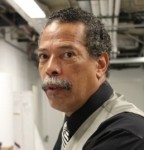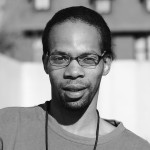Staging Innovation: Uniting Theatre Arts and Social Work in a Museum Setting
Day 2 / Apr, 13 @ 4:15 pm
Lower Level : Room A
For five months the Pulitzer has partnered with Prison Performing Arts, St. Patrick Center, and Employment connection to present Staging Reflections of the Buddha, a community project inspired by our highly successful Staging Old Masters project of 2009. The project unites theater, visual arts, and social work to build connections between the art and all audiences while transforming lives and fostering connections between communities.
The program works with a group of former prisoners and homeless veterans training them to become actors through weekly workshops that also include art exploration and instruction, theatre exercises, meditation, and rehearsals. Concurrently, the actors work with St. Patrick Center and Employment Connection to apply their art experiences toward achieving their goals, which include but are not limited to, obtaining housing and employment and re-integrating into society. The workshops culminate in performances of an original work created by the actors.
After two successful Staging programs, the question is what happens next? Can we replicate the program again, and if so, in what capacity? Can the program be exported to another museum or arts institution? Can the program develop into an organization on its own?
Speaker(s):
Emily Augsburger
St. Louis, Missouri

Emily Augsburger (moderator), Community Projects Coordinator, The Pulitzer Foundation for the Arts, graduated with from the George Warren Brown School of Social Work in 2010 and is a Community Arts Training Graduate from 2011. She served as the assistant producer on the Staging Reflections of the Buddha project at the Pulitzer. Augsburger has served as the Community Projects Coordinator for the Pulitzer for two years exploring the role of art in community building and development, while also investigating arts institutions’ function and responsibility in these settings. Her professional interests include creating new pathways for social workers in nontraditional setting.
Leslie Scheuler
St. Louis, Missouri

Leslie Scheuler, President and Founder, LS Associates, served (along with her team) as the external evaluator for both Staging projects. With degrees in music, social work, and social science research, Leslie has worked as a teacher, grant writer, social worker, musician, and consultant. Prior to establishing LSA, Leslie was a Senior Associate at Philliber Research where she directed the St. Louis office for 14 years. Leslie has completed projects for the U.S. Department of State, America SCORES, the Museum of Contemporary Art-Chicago, the American Camp Association, the P.S. 1 Contemporary Art Center/MoMA, the Missouri Department of Elementary and Secondary Education, the New World Symphony, North Carolina Dance Theatre, the Missouri History Museum, Planned Parenthood of the St. Louis Region, the Dancing Classrooms program of the American Ballroom Theatre, the Buder Center for American Indian Studies, Opera Theatre of Saint Louis, the American Red Cross, the National Conference for Community and Justice, the Museum of Latin American Art (Long Beach, California), the Oregon Symphony, ACCION, the Colorado Symphony, the National Arts Journalism Program, the Buder Center for American Indian Studies, the Center for Lobbying in the Public Interest, and numerous other organizations. Leslie has conducted training workshops for the Jewish Federation of St. Louis, the Trio Foundation, the Sisters of Mercy of the Americas Foundation, the Greater St. Louis Community Foundation, the Alliance for Capacity Building, and the North Carolina Center for Nonprofits. In addition to her work with LSA, Leslie teaches piano and volunteers for various organizations in the St. Louis area.
Emily Piro
St. Louis, Missouri

Emily Piro, Case Manager, St. Patrick Center, Piro has served a variety of roles in social services, from coordinating local action protesting civil rights abuses, to teaching theater to at-risk youth through the Division of Youth Services, to case management for ex-offenders and homeless adults at the St Patrick Center. Piro’s primary interest in social services is “non-traditional case management,” the practice of creatively exploring the role of learning styles and social perceptions for problem-solving and personal growth. She is a certified Offender Workforce Development Specialist, a Recognized Associate Substance Abuse Counselor, and a 2008 Grand Center Visionary Award honoree.
Gerald Young
St. Louis, Missouri

Gerald Young, Security Officer, The Pulitzer Foundation for the Arts, Retired SLPD Officer, grew up in St. Louis, Missouri. He is quite possibly one of the best people you will ever meet and served as a St. Louis Police Department patrol officer for 27 years. He recently retired from the SLPD and has taken up more fishing and spending his days of retirement working part time at the Pulitzer, where he has been a security officer for the past three years. Young, a member of the Pulitzer’s gallery staff, provided valuable support for both Staging Old Masters (2009) and Staging Reflections of the Buddha (2012). Visitors can spot him in the Pulitzer galleries with a toothpick adorning his ever-present smile.
Samantha Thomas
St. Louis, Missouri

Samantha Thomas, Actor, Staging Old Masters/ Staging Reflections of the Buddha, moved to St. Louis from Germany seven years ago at the age of 20. Thomas is an alumni from Staging Old Masters, which she participated in early in her recovery process. The program greatly influenced her patterns of thinking and life as a whole. Thomas is a frequent star on the Dean’s List, as she works towards her social work degree in order to become a drug treatment counselor.
Stephen (Ronnell) Riggins
St. Louis, Missouri

Stephen (Ronnell) Riggins, Actor, Staging Reflections of the Buddha, grew up in St. Louis, and enjoys playing basketball. Not only is he pretty good at it, but it’s also a team effort that no one person can accomplish alone. Riggins is both mellow and quiet yet comes alive during performances. He lives for each day, and enjoys spending time with his children.
Lisa Harper Chang
St. Louis, Missouri

Lisa Harper Chang is currently the Community Projects Director at The Pulitzer Foundation for the Arts, a co-appointment with the George Warren Brown School of Social Work at Washington University in St. Louis, created to explore how social work and the arts can interact in meaningful ways. Under her leadership, the Pulitzer’s Community Projects Department has collaborated with various St. Louis institutions working in the arts, social services, and community development. Harper Chang developed Staging Old Masters and Staging Reflections of the Buddha, programs designed to use art to build bridges among former prisoners, veterans, and the general public. She graduated from the Community Arts Training Institute in 2010.
Harper Chang received her MSW from the George Warren Brown School of Social Work at Washington University in St. Louis, and a BA in Computational and Applied Mathematics from Rice University in Houston, Texas. She has a background and is experienced in nonprofit development and fundraising in the D.C./Baltimore area. She also has led meditations in the Baltimore City Women’s Detention Center, played a vital role in research at a Missouri Division of Youth Services facility, and coordinated an evaluation project of co-occurring disorder clinics across the state of Missouri. Additionally, she has a strong commitment to social change through policy and has worked with the Alzheimer’s Association’s State Advocacy Director to research, and eventually testified in front of the Missouri State Senate Committee on Health, Mental Health, Seniors, and Families regarding long-term care partnership programs.
Her areas of interest include exploring and evaluating ways how social work when combined with cultural practices can be used to empower and help fulfill the inherent potential in all persons.





